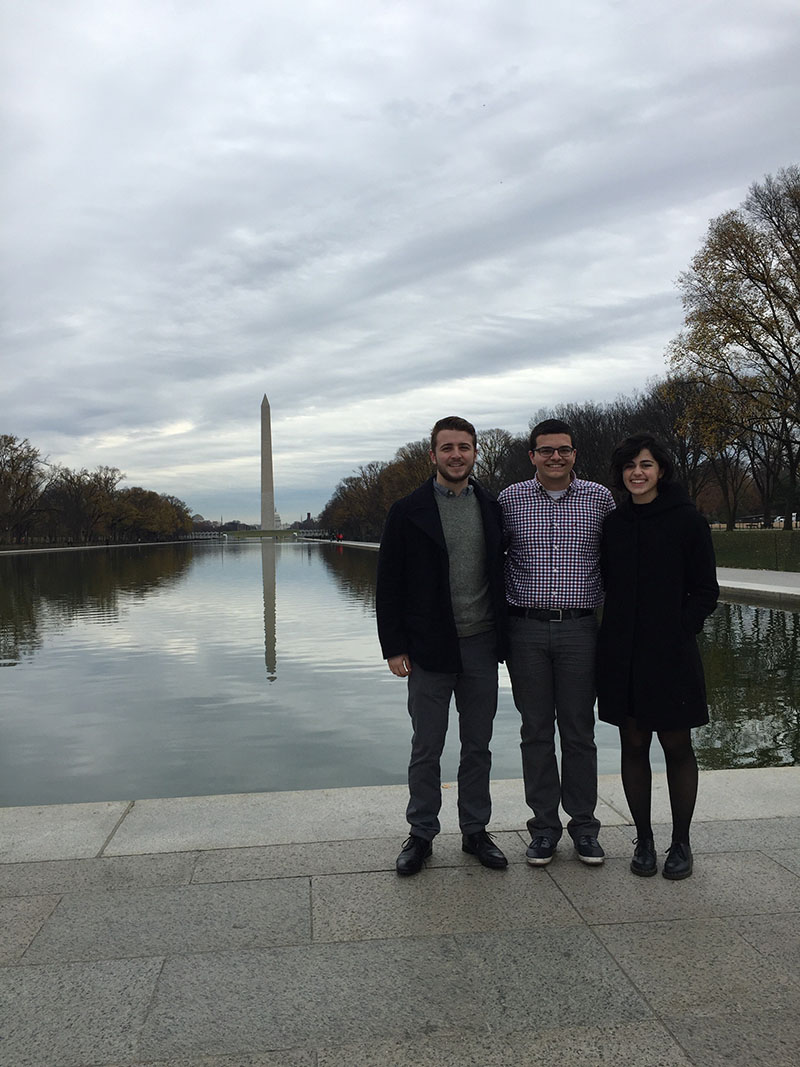 By Lini S. Kadaba
By Lini S. Kadaba
It seems simple enough. Low-income families in need of food can turn to community pantries for help.
In reality, though, it can be an onerous process to locate food pantries, figure out hours of operation and other details. As part of a new co-op with nonprofit PeaceTech Lab, Drexel environmental engineering student Bryce Peckman has brainstormed ways technology can benefit hungry families.
“To get food, you have to run around all of Philadelphia,” says the 20-year-old pre-Junior from Manasquan, N.J., who is working with the People’s Emergency Center in West Philadelphia. Her project, part of PeaceTech’s Urban Technical Extension, takes technology usually reserved for international conflict zones and applies it to domestic issues. The Washington, D.C.,-based lab is an offshoot of the nearby United States Institute of Peace (USIP), which has partnered with Drexel for the school’s peace engineering program.
One potential idea, Peckman notes, is a website with an interactive map that would identify nearby food distributors, including cupboards and hot meal locations, and offer reviews of customer service, among other information. “There’s a lot of ways that technology can improve daily lives,” she says.
Peckman is among three students partaking in co-ops with PeaceTech, which develops or deploys technology (such as interactive maps) to reduce conflict—whether election violence, interethnic hatred or resource shortages—in such far-flung places as Kenya, Afghanistan and Indonesia. This first-of-its-kind lab strives to connect engineers with NGOs and government agencies to find innovative solutions. Through its Urban Technical Extension, it works to make a difference stateside as well.
In 2015, Drexel became the first academic institution to join forces with USIP and PeaceTech. Since then, the relationship has led to co-ops, conflict resolution classes for engineers, and plans for a master’s curriculum in the burgeoning field of peace engineering—all of which places Drexel at the forefront of the international effort to encourage humanitarian engineers.
In addition to her work with the People’s Emergency Center, Peckman also is helping to plan a practitioners’ forum for Global Partnerships Week 2017, which promotes discussion between public and private sectors.
Meanwhile, biomedical engineering senior Matt Coates is identifying low-cost, easy-to-use technologies that can be adapted by locals to solve community problems. His findings will be shared at a PeaceTech Exchange workshop planned for Costa Rica. “The goal is to basically give local actors the tools that they need to build something for themselves,” he says. “They know what problems are in their community.”
The 21-year-old from Stratford, N.J., points to the tool Ushahidi as one example. The free platform for information collection and interactive mapping was used during the 2010 earthquake in Haiti, where tweets were analyzed to identify hard-hit areas and then direct aid relief efforts. Ushahidi also has been used to monitor foreign and U.S. elections and report polling irregularities, he says.
For another project, Coates is working with the Open Situation Room Exchange (OSRx). Created by PeaceTech, the data hub leverages social media to provide real-time insights into economic, social and political conditions on the ground in conflict zones, he explains.
Sophomore Paul DeSantis, 19, of East Meadow, N.Y., also a biomedical engineering major, is using his PeaceTech co-op to help build Drexel’s new master’s curriculum in peace engineering, slated to launch next fall[2017]. He also is exploring tools that future peace engineers can use and posting the information at the PeaceTech Wiki as a resource for peacebuilders.
While Coates is based at PeaceTech in Washington, the other two students work on their projects remotely from Drexel with occasional visits to the lab.
For all three, the PeaceTech co-ops have solidified their interest in using engineering to better lives.
“It fits really well with my own interests,” Peckman says. “I’m really active in social outreach and social wellness and the environment.” As a member of the executive board for Drexel Urban Growers, she has worked with Mantua and Powelton Village residents to plant a community vegetable garden. The recent harvest resulted in 900 pounds of produce.
Exposure to PeaceTech, as well as peace engineering, was an eye-opener for DeSantis. “I previously thought you can’t really work as an engineer and be involved in the community,” he says. “You might work for a company that develops something that might benefit the community. With peace engineering, you can interface directly with the community and figure out for yourself what their needs are and what they believe their needs are and do your best to build solutions.”
For Coates, the PeaceTech co-op stands in stark contrast to industry-focused experiences he has had. “This co-op gets me experience that is atypical for an engineering major,” he says. “This type of work, you can really see how you’re helping people.”
Peckman agrees. “The draw to become an engineer is to begin solving the world’s most complex problems,” she says. “I do feel there’s a way to create social justice with technology.”